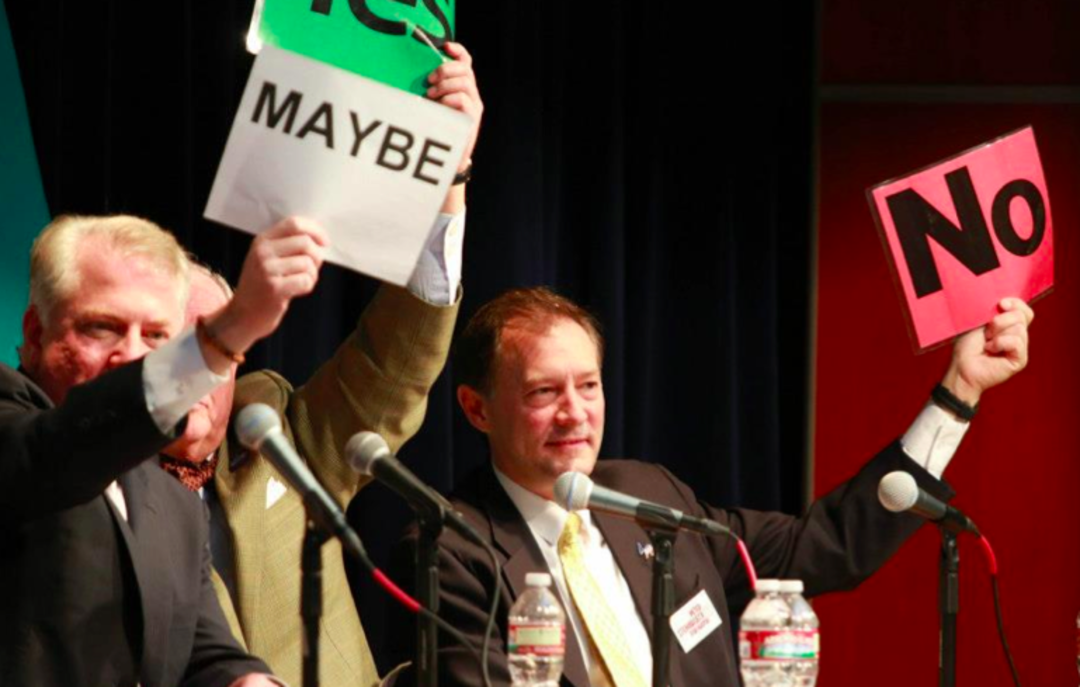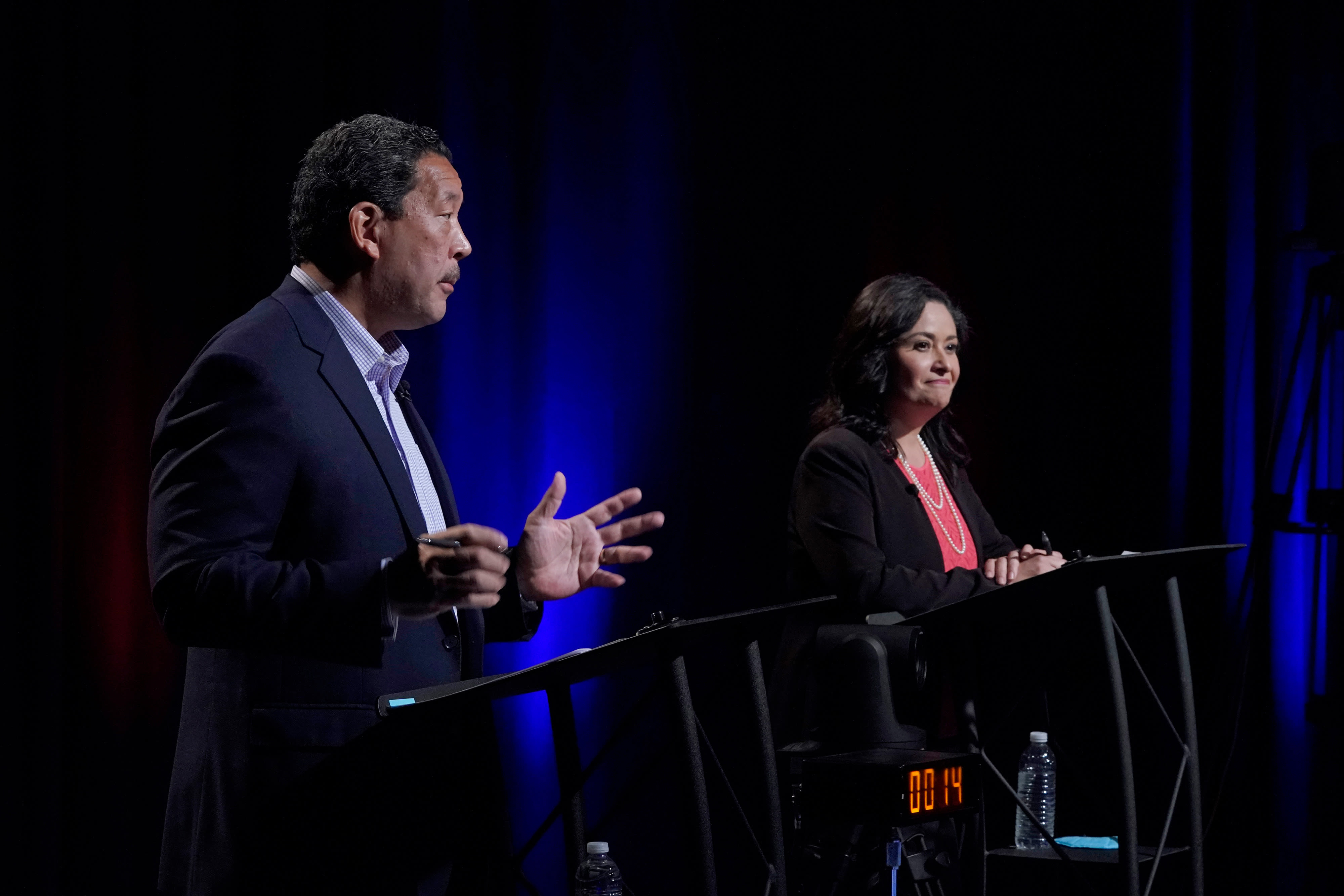Deconstructing the Candidates' Yeses, Nos, and Maybes

Image: Al Garman
Lots of people find lightning-round questions at debates superficial, but we think they're loaded with meaning.
It's time to deconstruct all the Yeses, Nos, and Maybes from last Thurday's night's mayoral forum in Wallingford.
Q: Do you support biennial reconfirmation of the police chief by the mayor and city council?
No: Burgess, Murray, and Staadecker.
Yes: Harrell, Martin, and Steinbrueck.
Maybe: McGinn.
McGinn's equivocation on more accountability for the chief is tone deaf. It comes just a few weeks after the police chief he appointed, John Diaz, announced he was stepping down after numerous instances of apparent racially biased policing and allegations of excessive use of force. And at a time when the SPD is under a consent decree for use of excessive force.
Q: Do you support the Seattle Districts Now campaign, which would change the at-large city council to a council with seven members elected by geographical districts and two elected at-large?
No: Burgess.
Yes: McGinn.
Maybe: Harrell, Martin, Staadecker, Murray, and Steinbrueck.
Obviously, McGinn would benefit as mayor if council members' power was diluted: He would represent the entire city, while each of the seven districted council members would answer only to a single geographic district. On the other hand, it's interesting that Burgess, who would also benefit from a weaker council if elected mayor, opposes them anyway; he says it's because district elections would "pit neighborhood against neighborhood" and wouldn't increase minority participation in elections or turnover on the council.
Q: North and South Seattle were promised sidewalks when they were annexed over 50 years ago. Will you make good on that promise?
Yes: Burgess, Harrell, Martin, McGinn, Murray, Steinbrueck.
Maybe: Staadecker.
It's hard to say no to sidewalks, yet that's exactly what Seattle (including under the recent leadership of Harrell, Burgess, and McGinn) has been doing for half a century.
Staadecker—who later said he wouldn't promise Seattle residents new transit because he didn't know if we could afford to pay for it—was the only candidate whose candid answer acknowledged that sidewalks are one of many city funding priorities.
Q: Do you support the proposed SoDo arena?
Yes: Harrell, McGinn, and Staadecker:
Maybe: Burgess, Martin, and Murray:
No: Steinbrueck.
This is an odd answer from Burgess, who has loudly taken credit for improving the arena proposal and making it a better deal for the city. Does he like the arena deal or or doesn't he?
Steinbrueck, at least, has been consistent: He hates the arena, and loves making sure everybody knows it.
Q: Will you push for later bar closing hours? (Currently, bars must close at 2am; McGinn has proposed allowing 24-hour liquor service.)
Yes: McGinn, Murray, and Steinbrueck.
Maybe: Burgess and Harrell.
No: Martin and Staadecker.
As mayor, McGinn has already pushed the state liquor control board to allow staggered, and later, closing hours—and failed. Meanwhile, by straddling the fence on this urbanist proposal, Burgess missed an opportunity to distance himself from his infamous panhandling legislation, which made him look like a law-and-order scold.
Q: Do you support implementing a regular gun buyback program?
Yes: McGinn, Murray, Staadecker, and Steinbrueck:
No: Burgess, Harrell, and Martin.
Burgess says he opposes regular gun buybacks because they don't deter gun crime. Since the first gun buyback in Baltimore in the early 1970s, he says, "They have been studied rather extensively and they do not lead to reductions in gun violence and they do not result in guns that are typically used in crimes being taken off the street." Buyback programs, Burgess adds, "can easily become a distraction from the kind of sensible gun control or gun safety measrues that we really should be pursuing."
Harrell did not return our call.
Q: Do you support zoning changes for microapartments (which are currently treated differently than studio apartments under city law because they have shared kitchens)?
The council is considering new regulations that would classify each living space in a microhousing building as an individual unit, triggering neighborhood notification and design review.
Yes: Burgess, Harrell, Martin, and McGinn.
Maybe: Murray, Staadecker, and Steinbrueck.
Steinbrueck, the supposed throwback candidate, leads the pack as an urbanist who isn't afraid to consider taxing something that is part of the problem.
It's interesting to us that Steinbrueck—supposedly the anti-urbanist candidate in this pack—doesn't seem especially concerned about microhousing, which some single-family neighborhood activists have argued will destroy the character of their neighborhoods and overwhelm on-street parking.
Worth noting: Steinbrueck recently moved from a 400-square-foot First Hill condo to a slightly larger Ravenna co-op.
Q: Do you support expanding the Seattle paid sick leave policy?
No: Burgess, Martin, Staadecker.
Maybe: Harrell, McGinn, Murray, and Steinbrueck.
Although Burgess initially resisted the paid sick leave law, he ultimately voted for a compromise bill after negotiating changes that made it more palatable to the business community, including an exemption for very small businesses and a provision allowing restaurant employees to swap shifts in lieu of sick leave. Burgess' chamber of commerce base is pretty mad that he ultimately worked to nudge the law across the finish line.
Expansion of the policy could include rolling back some of those provisions or increasing the number of hours of sick time employers have to provide. Looks like Burgess' support for the law only goes so far. Was he trying to win his pals back?
Q: Do you support expanding the use of surveillance cameras?
Yes: Harrell.
No: Murray.
Maybe: Burgess, Martin, McGinn, Staadecker, and Steinbrueck.
We were intrigued by Murray's lone 'No' answer and asked him to explain. He said the idea of being like London, where officials can watch pretty much everything citizens do, "doesn't appeal to me," noting that he was "concerned about the potential for that type of surveillance to erode civil liberties"—which reminded him of the issues with drones. Citing things like the annual gay pride parade, though, he said that if there are major public events where people have legitimate concerns about public safety there could be temporary exceptions, "but we shouldn't just give a blank check."
Q: Did McGinn save the Fourth of July fireworks?

Image: Al Garman
Yes: Martin.
No: Burgess, Harrell, Staadecker, and Steinbrueck.
Maybe: Murray.
Abstain: (but smirking as always) McGinn.
PubliCola: They were never in trouble in the first palce. This is a fabricated story every year.
Q: Do you support tolling on I-90?
Yes: Burgess, Martin, Murray, and Steinbrueck
No: Harrell and Staadecker.
Maybe: McGinn.
An unequivocal Yes seems like the only answer answer for anyone running for Seattle mayor given that this is a key funding component for the Seattle side of the 520 project. In Harrell's case, maybe he voted no because like all Eastsiders (Harrell owns a million-dollar condo there), he doesn't like tolling one of the major roads home. Harrell also owns a home in Southeast Seattle.
As for McGinn's maybe: His anti-tolling rap during his anti-tunnel campaign puts him in a funny spot.
Q: The city of London charges a congestion fee for cars to enter downtown. Do you support a similar charge or fee for downtown Seattle?
No: Burgess, Harrell, Martin, McGinn, Murray, and Staadecker.
Maybe: Steinbrueck.
Again, Steinbrueck, the supposed throwback candidate, leads the pack as an urbanist who isn't afraid to consider taxing something—driving downtown—that is part of the problem in an increasingly dense city.
And there were a batch of questions where the candidates all answered the same way.
Q: Will you remove Seattle police union president Rich O'Neill from the city payroll?
All seven candidates said yes.
We have to wonder if this batch of Democrats would be as unanimous in their outrage if the question was about a similar set up with the Seattle School District's union leader. (For the record, though, the teachers' union does reimburse district for SEA president, Jonathan Knapp's, salary.)
Q: Do you support doubling the number of separated bike lanes in the city?
All seven candidates said yes.
That's pretty rich coming from Harrell, who—in the very same debate—criticized the mayor for spending too much money on bike lanes and not enough on "basics."
Q: Do you support Puget Sound Bike Share?
All seven candidates said yes.
It's pretty hard to imagine a candidate for Seattle mayor opposing a (private) company that makes it easier and more convenient to get around without a car.
Q: Do you support the use of red light cameras?
All seven candidates said yes.
Q: Do you support public financing of local campaigns?
All seven candidates said yes.
Again, although all seven candidates said they opposed paying police union head O'Neill's salary, they're all apparently fine with taxpayers footing the bill for Kate Martin or Bruce Harrell or Mike McGinn to run for office—perhaps because public campaign financing and teachers' unions are an easier sell in liberal Seattle than the police lobby.
Q: Do you support coal trains?
All seven candidates said yes.
Kidding!
Q: There are only a few areas in Seattle where the sale of recreational marijuana would currently be allowed. Do you support relaxing those restrictions to allow pot to be sold in more parts of the city?
All seven candidates said yes.
Q: Will you prohibit SPD from using drones?
All seven candidates said yes.
McGinn came to Jesus on the drone issue after a huge public outcry when the city's drone program, which was authorized by McGinn's own police department, came to light. The program itself was miniscule: Just two drones, which SPD planned to use in hostage situations and in search-and-rescue operations.
Q: Do you support expanding the city's streetcar network?
All seven canddiates said Yes.
Q: Do you support light rail expansion?
All seven candidates said yes.
The city council has been skeptical of McGinn's proposals to speed up a study of light rail along Eastlake to the U District and from downtown to Ballard. In other words, they support the idea of light rail expansion—juts not McGinn's vision for light rail expansion.
Q: Will you relax restrictions on sidewalk food vendors?
All seven candidates said Yes.
Given that street vendors are already allowed pretty much everywhere in the city (city rules prohibit them within 50 feet of an existing brick-and-mortar restaurant or within 15 feet of a non-food business), the unanimous response reads like Portlandia-level pandering: The only possible "relaxations" on street food restrictions, at this point, would have to involve things like loosening health rules (which are set jointly by the city and county) or allowing food carts even closer to existing restaurants.




